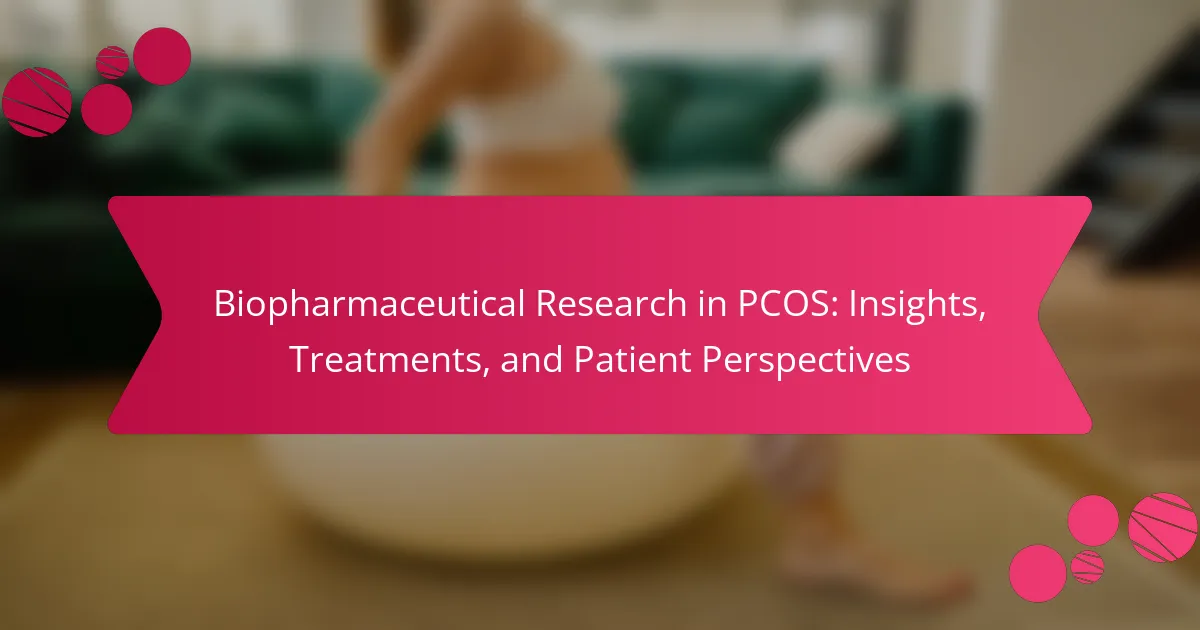Biopharmaceutical research in PCOS offers innovative treatments that significantly improve patient outcomes. This article explores the role of insulin-sensitizing agents, hormonal therapies, and lifestyle interventions. It also examines patient perspectives that emphasize the importance of personalized medicine. Lastly, we will discuss future trends in targeted therapies and advancements in drug delivery systems.

What are the key insights from biopharmaceutical research in PCOS?
Biopharmaceutical research in PCOS highlights innovative treatments and patient perspectives. Recent studies emphasize the role of insulin-sensitizing agents, hormonal therapies, and lifestyle interventions in managing symptoms. Emerging therapies target specific pathways, improving outcomes and quality of life. Patient-reported outcomes indicate a growing interest in personalized medicine approaches.
How do hormonal imbalances affect PCOS symptoms?
Hormonal imbalances significantly worsen PCOS symptoms. Elevated androgen levels can cause irregular menstrual cycles, weight gain, and acne. Insulin resistance, another common imbalance, exacerbates these symptoms and increases the risk of type 2 diabetes. Addressing these hormonal issues through biopharmaceutical treatments can improve patient outcomes and enhance quality of life.
What role do genetic factors play in PCOS development?
Genetic factors significantly contribute to the development of PCOS by influencing hormone levels and metabolic processes. Variations in specific genes can affect insulin sensitivity and androgen production, which are crucial in PCOS pathology. Studies indicate that women with a family history of PCOS are more likely to develop the condition, suggesting a hereditary component. Understanding these genetic influences can guide personalized treatment approaches in biopharmaceutical research.
Which biomarkers are crucial for PCOS diagnosis and treatment?
Key biomarkers for diagnosing and treating PCOS include insulin resistance, androgen levels, and hormonal profiles. Elevated insulin levels often indicate metabolic dysfunction, while increased androgens can lead to symptoms like hirsutism. Hormonal assessments, including luteinizing hormone (LH) and follicle-stimulating hormone (FSH), help evaluate ovarian function. Identifying these biomarkers is essential for personalized treatment strategies.

What biopharmaceutical treatments are currently available for PCOS?
Several biopharmaceutical treatments are available for PCOS, including insulin sensitizers, hormonal therapies, and anti-androgens. Insulin sensitizers like metformin improve insulin resistance, while hormonal therapies regulate menstrual cycles and reduce symptoms. Anti-androgens, such as spironolactone, help manage acne and hirsutism. Emerging treatments focus on addressing underlying metabolic issues and improving fertility outcomes.
How do insulin-sensitizing agents work in managing PCOS?
Insulin-sensitizing agents manage PCOS by improving insulin sensitivity, which helps regulate hormonal imbalances. These agents, such as metformin, reduce insulin resistance, leading to lower androgen levels and improved ovulatory function. Enhanced insulin sensitivity can also promote weight loss, further alleviating PCOS symptoms. Research indicates that this approach can lead to better metabolic profiles and reproductive outcomes in patients with PCOS.
What are the benefits of hormonal therapies in PCOS treatment?
Hormonal therapies in PCOS treatment offer significant benefits, including regulation of menstrual cycles, reduction of androgen levels, and improvement in insulin sensitivity. These therapies can mitigate symptoms such as acne and hirsutism, enhancing quality of life for patients. Additionally, they may reduce the risk of long-term complications like type 2 diabetes and cardiovascular diseases. Studies indicate that combined oral contraceptives are effective in managing symptoms and restoring hormonal balance.
Which emerging biopharmaceuticals show promise for PCOS?
Emerging biopharmaceuticals that show promise for PCOS include metformin, inositol, and letrozole. Metformin improves insulin sensitivity and may aid in weight management. Inositol supports ovarian function and hormonal balance. Letrozole, an aromatase inhibitor, is effective in inducing ovulation. These treatments represent innovative approaches in managing PCOS symptoms and improving patient outcomes.

How do patient perspectives shape the approach to PCOS treatment?
Patient perspectives significantly influence PCOS treatment approaches by highlighting individual needs and preferences. Incorporating patient feedback enhances treatment efficacy and adherence. Research shows that personalized care models, informed by patient experiences, lead to improved outcomes. Engaging patients in decision-making fosters trust and satisfaction, ultimately shaping treatment frameworks.
What are common challenges faced by PCOS patients in treatment?
PCOS patients often face challenges like hormonal imbalance, weight management, and emotional distress during treatment. These issues can hinder effective management and lead to treatment non-compliance. Additionally, patients may experience difficulty accessing specialized care and understanding their treatment options. These factors contribute to a complex treatment journey, necessitating a comprehensive approach that includes medical, psychological, and lifestyle interventions.
How do cultural attitudes influence PCOS management?
Cultural attitudes significantly influence PCOS management by shaping perceptions and treatment approaches. Societal beliefs about health, femininity, and body image impact how patients seek care and adhere to treatments. For instance, stigma around weight can deter individuals from pursuing necessary lifestyle changes or medical advice. In cultures that prioritize traditional medicine, patients may opt for herbal remedies over biopharmaceutical options, affecting treatment efficacy. Furthermore, support systems within cultural contexts can enhance or hinder patient engagement in managing PCOS effectively.
What support systems are vital for PCOS patients?
Support systems vital for PCOS patients include healthcare professionals, support groups, and educational resources. Access to endocrinologists, nutritionists, and mental health experts ensures comprehensive care. Peer support groups provide emotional encouragement and shared experiences. Educational resources empower patients with knowledge about management strategies and treatment options. These systems enhance patient outcomes by fostering a collaborative approach to health management.

What are the implications of biopharmaceutical research on PCOS management?
Biopharmaceutical research significantly enhances PCOS management by introducing innovative treatments and improving patient outcomes. Recent advancements focus on targeted therapies that address hormonal imbalances and metabolic dysfunctions associated with PCOS. For instance, drugs that modulate insulin sensitivity have shown promise in reducing symptoms and improving fertility. Additionally, patient perspectives highlight the importance of personalized treatment plans derived from ongoing research, which cater to individual needs and experiences. This evolving landscape underscores the necessity for continuous research to optimize management strategies for PCOS.
How can personalized medicine improve outcomes for PCOS patients?
Personalized medicine can significantly enhance outcomes for PCOS patients by tailoring treatments to individual genetic and hormonal profiles. This approach improves symptom management and reduces side effects. Research shows that personalized therapies can lead to better ovulation rates and metabolic health. Additionally, patient perspectives highlight increased satisfaction and adherence to treatment plans, indicating a positive impact on overall well-being.
What are the ethical considerations in PCOS biopharmaceutical research?
Ethical considerations in PCOS biopharmaceutical research include informed consent, patient safety, and equitable access to treatments. Researchers must ensure participants understand study risks and benefits. Additionally, the potential for bias in treatment efficacy and the need for diverse representation in trials are crucial. These factors help maintain integrity and trust in the research process.
How do regulatory frameworks affect biopharmaceuticals for PCOS?
Regulatory frameworks significantly influence biopharmaceuticals for PCOS by establishing guidelines for drug development, safety, and efficacy. These frameworks ensure that treatments undergo rigorous testing before approval, impacting the availability of innovative therapies. For instance, the FDA’s expedited programs can accelerate access to promising treatments for PCOS patients. Additionally, compliance with regulations can affect research funding and collaboration opportunities, shaping the landscape of biopharmaceutical innovations. Overall, these frameworks play a crucial role in determining treatment options and patient outcomes in PCOS management.

What future trends are expected in biopharmaceutical research for PCOS?
Future trends in biopharmaceutical research for PCOS include personalized medicine, advancements in gene therapy, and improved drug delivery systems. These innovations aim to enhance treatment efficacy and patient outcomes. Personalized approaches will utilize genetic data to tailor therapies, while gene therapy may target hormonal imbalances directly. Additionally, novel drug delivery methods will increase treatment adherence and effectiveness. As a result, these trends promise to revolutionize PCOS management and improve quality of life for patients.
How will advancements in technology impact PCOS treatment options?
Advancements in technology will significantly enhance PCOS treatment options through personalized medicine and innovative therapies. Biopharmaceutical research is focusing on targeted treatments that address hormonal imbalances and metabolic issues. For instance, new drug formulations are being developed that specifically target insulin resistance, a common issue in PCOS patients. Additionally, telemedicine is improving access to specialists, allowing for timely interventions and ongoing patient support. As a result, these technological advancements are likely to improve patient outcomes and quality of life.
Which collaborative efforts are essential for advancing PCOS research?
Collaborative efforts essential for advancing PCOS research include multidisciplinary partnerships, patient advocacy involvement, and academic-industry collaborations. These collaborations enhance knowledge sharing and resource allocation. For example, integrating patient perspectives can guide research priorities and treatment development. Engaging diverse stakeholders fosters innovative solutions and accelerates progress in understanding PCOS.
What can patients do to stay informed about new treatments?
Patients can stay informed about new treatments by actively engaging with healthcare providers and utilizing reliable resources. Regular consultations with doctors can provide updates on the latest biopharmaceutical research in PCOS. Additionally, patients should explore reputable medical websites and journals that publish findings on emerging therapies. Joining support groups can also facilitate sharing experiences and insights about new treatment options among peers. Attending webinars and conferences focused on PCOS can further enhance understanding and awareness of innovative treatments.
What are best practices for managing PCOS effectively?
To manage PCOS effectively, adopt a multi-faceted approach focusing on lifestyle changes, medical treatments, and patient support.
1. Maintain a balanced diet rich in whole foods, including fruits, vegetables, and lean proteins. This can help regulate insulin levels and support weight management.
2. Engage in regular physical activity, aiming for at least 150 minutes of moderate exercise weekly. This improves insulin sensitivity and overall health.
3. Monitor menstrual cycles and symptoms to track changes, which aids in treatment adjustments and discussions with healthcare providers.
4. Consider medical treatments such as hormonal contraceptives or insulin-sensitizing medications, as prescribed by a healthcare professional.
5. Seek support from patient groups or counseling to address emotional and psychological aspects of PCOS, enhancing overall well-being.
